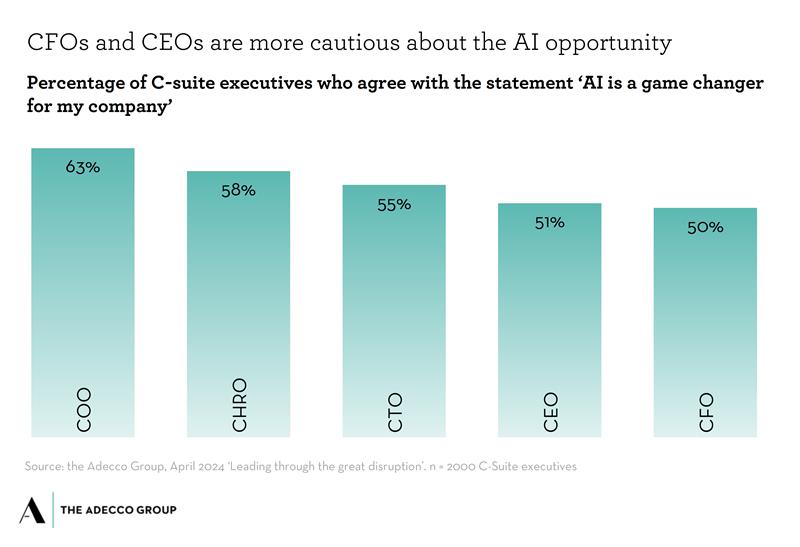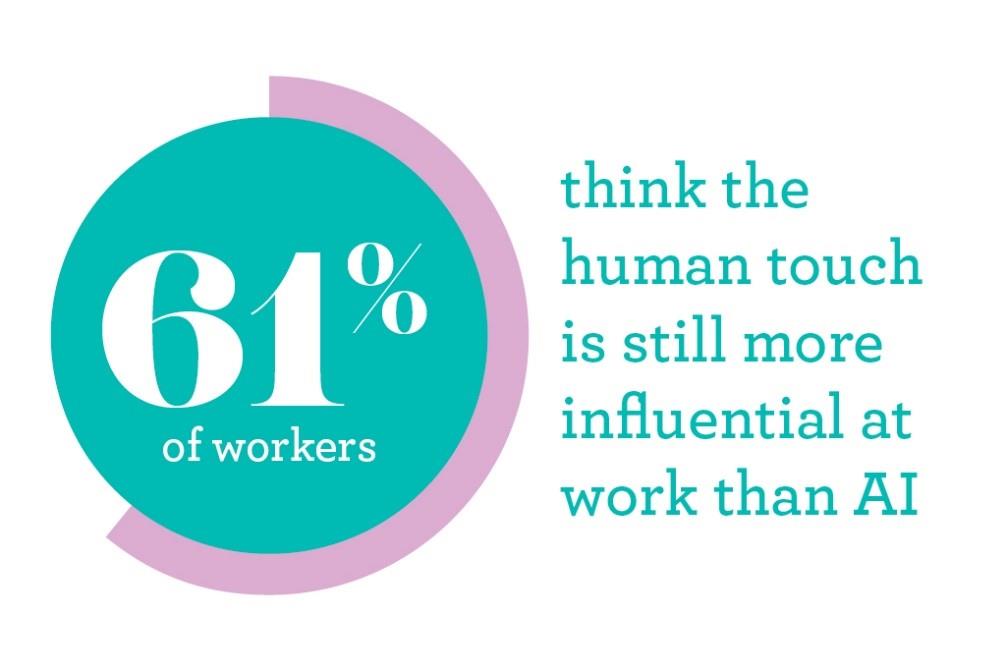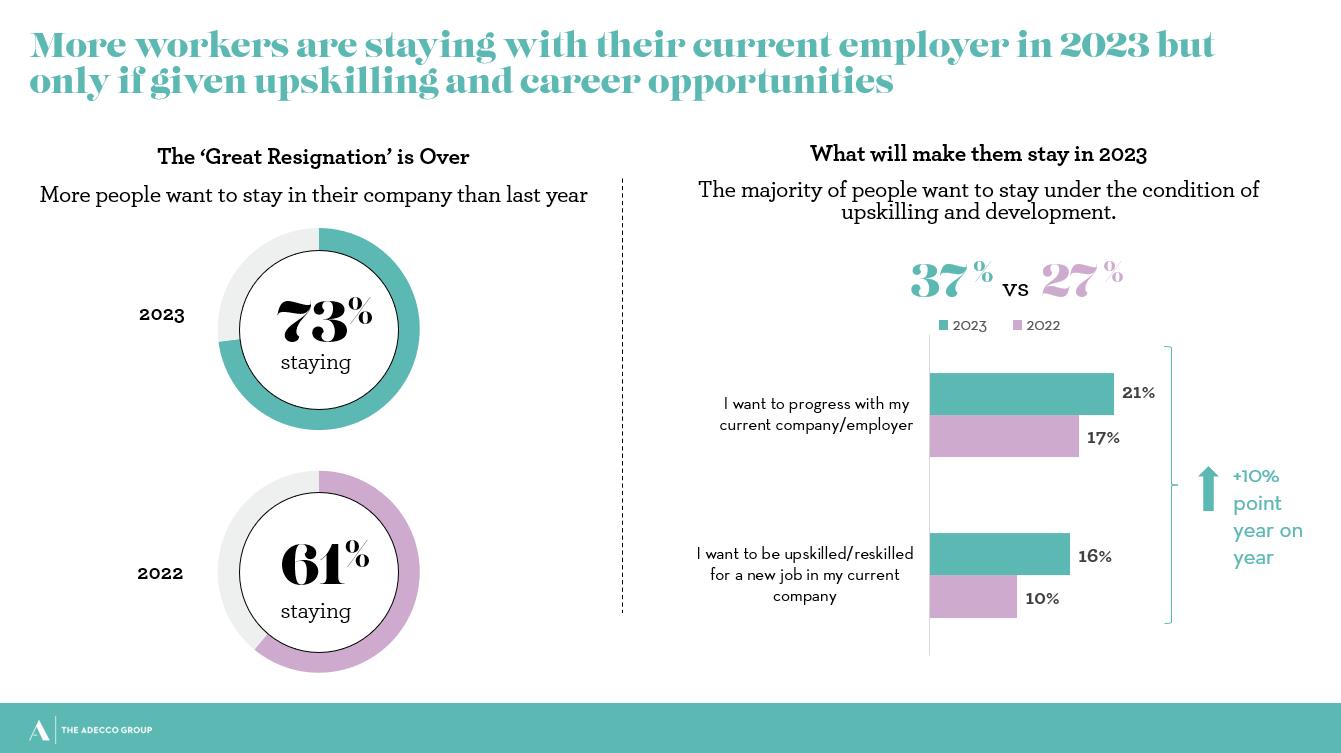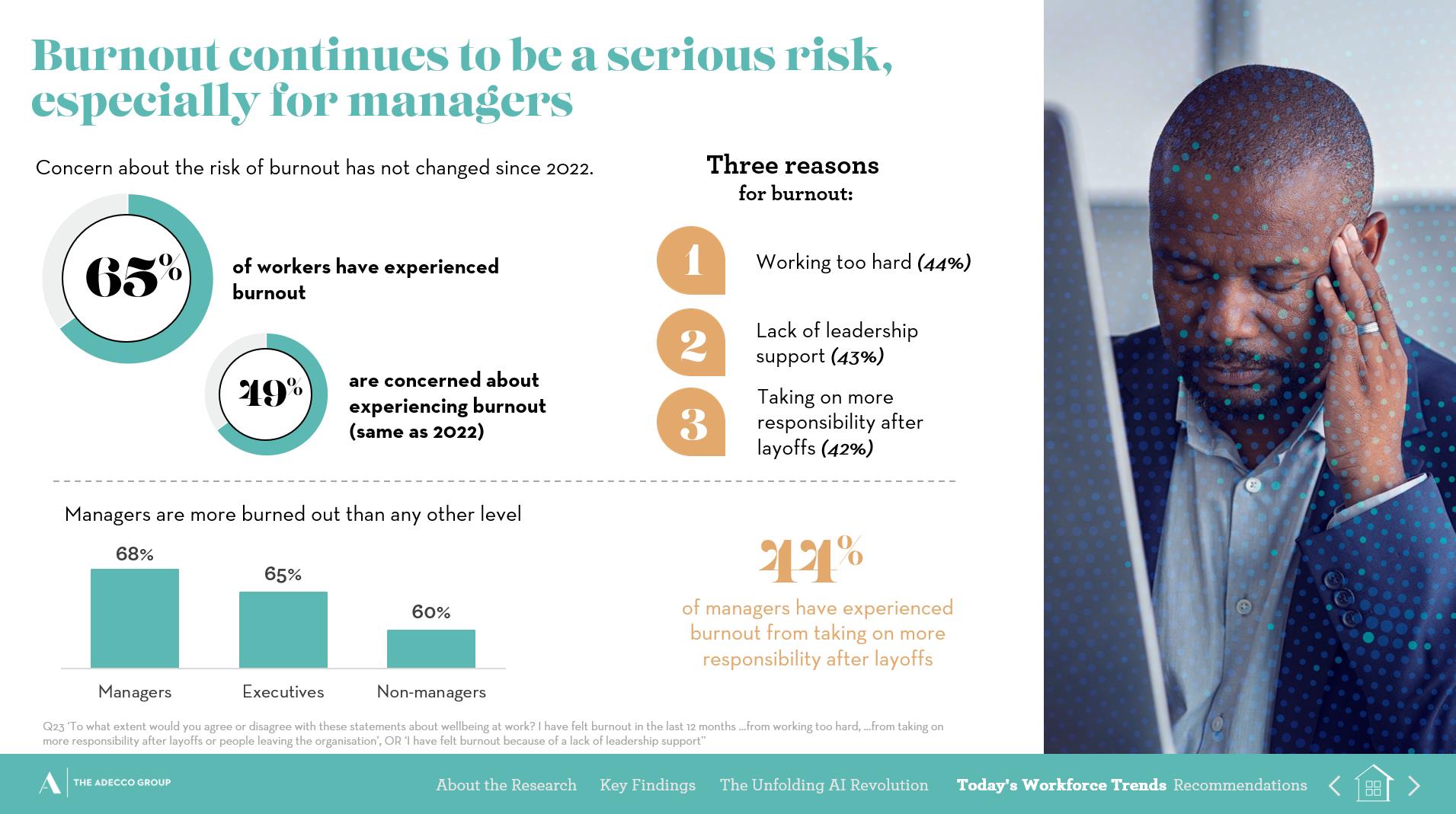Generative AI (GenAI) may be in its infancy, but there’s no doubt it has already changed the game. Leaders, strategists and workers across industries are debating how GenAI will impact the world of work.
Our annual Global Workforce of the Future research seeks to understand shifts in the world of work from a worker’s perspective. We surveyed 30,000 people across 23 countries to find out what they think. The research pool is nationally representative of all ages, genders, and a wide range of job functions.
While AI and GenAI were the focal point of this year’s insights, there were further notable takeaways about other critical trends shaping the workplace such as upskilling, wellbeing, or transferability of skills.
To meaningfully navigate the near future, leaders need to balance preparing for the future with fully engaging with and caring for workers in the present. This calls for change management, mapping new roles, upskilling, but also for a boost in internal mobility and a focus on workers’ well-being.
The Generative AI Honeymoon Phase
Generative AI is already the top workplace trend in 2023 and is set to become even more prominent in 2024 and beyond. Currently, around 70% of workers are actively using Generative AI, with the vast majority being captivated by its enormous potential.
Promoting widespread GenAI integration within organisations is becoming a priority for companies worldwide. Workers are largely onboard. Encouragingly, our research reveals that the majority (62%) of the people we surveyed believe that AI will have a positive impact on their job, and only 8% believe it will make their roles obsolete. However, recent estimates indicate that over 300 million jobs worldwide will be disrupted by AI in some way. To bridge the gap, organisations must urgently deploy upskilling measures at scale.

A third (30%) of workers say it will help them to learn new skills and progress in their role, and the same proportion (29%) believe it will make their job easier. A fifth (19%) say they think it will create more jobs in their industry.
Over half (58%) of workers think AI skills will improve their career options, with employees working in technology (69%), finance (67%) and e-commerce (63%) the most likely to believe that AI skills will improve their employability.
Overall, workers are optimistic about the future of AI and are eager for their employers to take the lead. But in some areas, this optimism may not fully align with the reality of AI in the workplace. Supporting workers to fully understand the potential impact of AI – how it will change the workplace, as well as how it will augment it – will be key to helping them adapt.
Access to Gen AI is not equal
Despite excitement and widespread adoption, access to generative AI isn’t equal, and there are significant training gaps – 57% of workers want AI training, but less than half are receiving guidance on how to use it.
The overwhelming majority (87%) of executives use AI compared to just 52% of non-managers. Over three quarters (78%) of those on a high income are using AI compared to less than two-thirds (60%) of low-income workers. And employees who hold a degree are 50% more likely to use AI than those with secondary school-level education (76% compared with 51%).
There is a significant risk that a gap could open up between workers who have access and training to use advanced tools and technology – and those who don’t. Without equal access, training and support, many will be left behind.
Workers who don’t use AI cite trust in the technology as the main reason for their reluctance. 35% say they don’t trust AI, over a quarter (27%) don’t believe that it’s relevant to their job, and a fifth (14%) don’t know what it is or how to use it. Ethics is another concern for workers; over half (51%) are worried that the use of AI could be unethical or discriminatory.
Organisations wishing to reap the rewards of an AI-powered workforce should focus on improving understanding and access. Addressing ethics and empowering all workers to adopt the technology will boost equity and could take businesses to the next level, ensuring no worker is left behind.
Uniquely human skills must be nurtured
AI skills will be vital for the future of work, and most employees want to be trained in the use of AI. But that doesn’t mean human skills will become obsolete.
As technology replaces many technical skills, soft skills will become increasingly important. The majority (61%) of workers say that the human touch is more influential at work than AI, with those working in technology the most likely (67%) to believe this.

People told us that emotional intelligence, empathy, active listening, and interpersonal skills were the least likely to be replaced by AI. There’s a clear motivation for organisations to invest in AI skills; but there’s also an imperative to continue investing in the power of human potential.
Fostering workers' uniquely human skills will require connecting them to coaching, leadership development, and training, as people, and soft skills must remain at the forefront of this technological disruption
Upskilling is the workplace perk of choice
AI wasn’t the only noteworthy trend this year. The world of work also saw undeniable shifts in the relationship between workers and their employers, with the end of the ‘great resignation’.
More workers will stay with their current employer in the next year – but only under the right conditions. Employees are more likely to remain in an organisation if they receive upskilling and career opportunities.
72% of people want to stay in their current organisation compared to 61% in 2022, and a greater proportion are seeking out progression opportunities within their organisation. 16% of workers say they want to be upskilled or reskilled for a new job in their company compared to 10% last year; and 21% are clear that they want to progress with their current employer (up from 17% in 2022).

Workers clearly want roles that will help them grow professionally, and employers seem to be responding. The likelihood of people agreeing that their employers are investing effectively in their skills development has increased since 2022.
However, development has not been evenly distributed: non-managers are being left behind. 45% of non-managers are being upskilled compared to 70% of managers.
Companies need to step up by embracing lifelong learning, fostering career development for managers and individual contributors, and offering greater internal mobility opportunities to retain and engage workers.
Skills are precious currency
In an increasingly dynamic environment, the workforce must be ready to shift roles and even industries. As AI automates work and makes some roles obsolete, transferable skills will be instrumental in keeping people in employment. The value of skills relative to career stability is rising as we are moving from a jobs-based economy towards a skills-based one.
Most workers (56%) are confident that their current skills are transferable to other industries. 61% of tech workers believe this, as do 57% of white-collar workers; but less than half (49%) of blue-collar workers are confident in the transferability of their skills.
Burnout is pervasive
The seismic shifts in the world of work continue to fuel high levels of burnout.
On average, 65% of workers feel burned out, but managers experienced more burnout than non-managers and executives.
The top three reasons for burnout included working too hard (44%), lack of leadership support (43%) and taking on more responsibility after layoffs (42%). 78% of workers report feeling unable to take a break at work, and only one-fifth feel encouraged by their employer to take annual leave.Wellbeing has become more of a focus in the workplace in recent years, and employers should continue to encourage employees to recharge. As managers and leaders know, a well-rested team is a more productive team.

Recommendations
Future-ready organisations exhibit four key traits: they embrace technological advancements and change, prioritise internal mobility, foster the development of skills and capabilities, and champion the well-being of their workers. Achieving agility, development and enviable culture is no mean feat. To succeed, its vital to establish the fundamental capacity for change. Before implementing large-scale change programs, leaders need to meet employees where they are. Organisations should evaluate workers’ existing skills and upskill accordingly. Providing opportunities and guidelines to learn and utilise new skills will help workers progress rapidly, and prevent employee attrition.
Beyond skills, a people-centric culture will attract and retain the best talent. Leaders should promote a culture of growth and resilience, build transparency and trust in the workplace, encouraging ownership and progression. Managers should encourage workers to look after their wellbeing through using annual leave, acknowledging the pressures of workplace challenges and providing support
Download What’s Working? Navigating the AI Revolution and the Shifting Future of Work research to learn more about the trends impacting the future of the world of work in 2023 and 2024, and the key actions organisations need to take to ensure their talent will thrive.
GLOBAL WORKFORCE OF THE FUTURE 2023
And watch the replay of the webinar where our Chief Sales and Marketing Officer Valérie Beaulieu discussed the findings of the report with a panel of leaders from Microsoft, Bank of America and Avanade.



